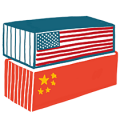

Chinese scholars highlight prolonged US-China competition
Summary:
- Chinese experts no longer see the United States as a beacon of democracy but as a dysfunctional political system on the verge of collapse. This shift is partly due to the marginalization of more liberal voices that had, in the past, highlighted democratic principles, not just failings of the system.
- Chinese scholars generally avoid endorsing either the Republican candidate Donald Trump or the Democrat’s nominee Kamala Harris, mirroring the government’s cautious official position. However, there is a clear consensus that US-China relations will remain strained regardless of the election outcome.
- The analysis of expert voices indicates that China is likely to focus on self-reliance and diversifying international partnerships as it prepares for prolonged competition with the US.
- Some scholars argue that a Harris presidency would continue Joe Biden's predictable, alliance-based approach, whereas a Trump presidency is expected to shift the US towards isolationism, potentially harming US-EU relations.
- Scholars discuss Europe’s need for strategic autonomy – especially in response to potential isolationist US policies – as an opportunity for China to strategically enhance ties with Europe.
 This analysis is part of “China Spektrum,” a joint research project with the China Institute of the University of Trier (CIUT) funded by the Friedrich Naumann Foundation. As part of this project, we analyze expert and public debates in China. Learn more about the project and find previous publications here.
This analysis is part of “China Spektrum,” a joint research project with the China Institute of the University of Trier (CIUT) funded by the Friedrich Naumann Foundation. As part of this project, we analyze expert and public debates in China. Learn more about the project and find previous publications here.
Intellectual debate within permissible limits: how Chinese scholars discuss the US presidential election
In a September press conference, when asked about Harris’s and Trump’s respective policies on tariffs, China’s Foreign Ministry spokesperson, Mao Ning, stated that China does not comment on US elections but opposes being used as a topic in them. Despite accusations of influence operations by the research company Graphika, China has refrained from publicly commenting on the candidates.
However, a Chinese translation of an article by prominent international relations scholar Wang Jisi and two colleagues, originally published in Foreign Affairs, was reprinted by several Chinese outlets, including the prominent Caixin magazine. In this article, the authors assess the pros and cons of both US presidential candidates for China, while predicting a continued tough, bipartisan stance on US-China relations.
Given the sensitivity of the topic, the reprinting of Wang’s article raises important questions: To what extent can Chinese scholars discuss the US elections in the domestic public sphere? What topics do they address, and what perspectives do they take?
To understand how the intellectual debate has played out in the run up to the 2024 elections, we chose two of the most prominent intellectual platforms, one, Aisixiang which has a more liberal and diverse editorial leaning, and the other, Guancha.cn, a party-state affiliated platform, hosting more conservative party-aligned and nationalistic voices. 13 articles were included in the analysis by searching for keywords related to the US election and the names of prominent scholars. We have identified the following key topics of debate.
Trump or Harris: Chinese experts reluctant to voice opinions
When it comes to China’s stance on a potential Harris or Trump presidency, expert voices in China have been cautious in offering direct opinions on either candidate.
Zheng Yongnian, political scientist and professor at the Chinese University of Hong Kong (Shenzhen), argues that on a broad, abstract level, China remains indifferent to who becomes the US president, as long as they promote “peace and development.” China will oppose any leader who threatens its core interests or global stability.
Yan Xuetong, a prominent international relations scholar, from Tsinghua University, stresses that regardless of the election outcome, US-China relations are likely to deteriorate further. He advises China to take caution against making public comments on US domestic politics, as it could be seen as interference.
Wang Jisi and his colleagues’ article offers a more outspoken analysis of the US election among the Chinese scholars. The President of the Institute of International and Strategic Studies at Peking University is skeptical that US policy toward China will shift significantly in the next decade, predicting continued strategic competition regardless of the 2024 election outcome. He anticipates a new Trump administration would implement more extreme trade measures, such as higher tariffs and deeper technological decoupling, while a Harris administration would likely maintain Joe Biden’s more predictable, alliance-based approach towards China.
From beacon of democracy to systemic collapse: Chinese intellectuals question US political system
US presidential elections have long been a focal point for Chinese liberals, who traditionally regard the US as a “beacon of democracy” (民主灯塔). However, the 2020 election revealed deep divides within China’s intellectual circles, leading to the emergence of pro-Trump and anti-Trump camps. At the time, prominent legal scholars and political commentators – such as law professors He Weifang, Zhang Qianfan, Zhang Xuezhong and Zhang Ming – still played a visible role, offering rational analysis that upheld democratic principles and counterbalanced more extreme views. Since then, however, the government has increasingly marginalized these liberal voices, pushing them out of the public sphere. In their place, nationalist critiques of the US political system have risen to dominate the discourse, closely mirroring the party-state’s narrative and leaving limited space for the more diverse perspectives that once contributed to China’s understanding of American democracy.
A growing skepticism toward the US political system is supported by a range of expert voices in China. Zhang Weiwei, professor at Fudan University, argues on Guancha.cn that the US was founded by “smugglers” (走私商人, referring to the 1773 Boston Tea Party) and slave owners, inherently making its system undemocratic and resistant to reform. He highlights the difficulty of amending the US Constitution, the flaws of the “winner-takes-all” electoral system, and procedural tactics like filibustering and gerrymandering, which maintain the interests of historical elites, making reform nearly impossible.
Similarly, Qiang Ge, professor at the Central Party School, emphasizes the deterioration of American politics under the influence of social media and “retail politics” (零售政治), where politicians on whistle-stop tours focus on small, niche issues to engage directly with voters. The current political landscape in the US demands political candidates' extreme online presence and high standards of physical fitness and vitality for success on the campaign trail.
Foreign critiques of the US system have also found their way into Chinese discourse, particularly through the nationalist platform Guancha.cn. One notable example there is the translation of a statement by Russian Foreign Ministry spokesperson Maria Zakharova, who likened the US election debates to a “duel on the Titanic,” casting doubt on their significance as the US grapples with what she described as systemic collapse.
Another translated piece centers on Russian far-right philosopher Aleksandr Dugin’s argument that, unlike Trump, who pragmatically prioritized America’s national interests while in power, the US Democratic Party is less focused on Americans’ needs and more intent on maintaining global dominance – even at the risk of world war – and seems willing to sacrifice the US itself.
Additionally, in a reposted piece on Guancha.cn, Yale University professor Zhang Taisu has analyzed how big capital and elites have sidelined federal power in the US, strengthening an “administrative state” (行政政府), where elected leaders can make only minor adjustments. This phenomenon has led to rising populism, reflected in Trump's rhetoric of a “deep state,” which fuels further distrust in the US political process.
Pragmatism over ideology: Chinese scholars on EU-US relations in Trump’s potential second term
EU-US relations are another key subtopic in Chinese scholars’ discussions of the US election. Three of the 13 analyzed articles focus on Trump’s potential isolationist stance toward transatlantic ties.
Cui Hongjian, Director of the Institute of European Studies at the China Institute of International Studies, suggests that Europe may take a more pragmatic approach during a second Trump term compared to his first. Initially, Europe criticized Trump harshly, calling him “worse than an enemy.” However, Europe may now prioritize practical interests and look for compromises, potentially reshaping transatlantic relations toward more interest-based collaboration. Similarly, Yan Shaohua, researcher at Fudan University’s Center for China-Europe Relations, highlights how Trump's potential return will reignite Europe's push for strategic autonomy, i.e., being less dependent on other countries.
Zhao Huaipu, Director of the European Studies Center at China Foreign Affairs University, adds that the EU is maintaining strategic ambiguity between China and the US, aiming to benefit from both sides in their competition. He advises China to consider the US and EU as a cooperative whole but differentiate between the EU, individual European countries, and the US on specific issues. Furthermore, Zhao advocates for exploring the possibility of establishing a US-China-EU trilateral interaction mechanism to reduce the risk of US-EU joint actions against China.
A Harris presidency suggests a more predictable approach while a Trump one could open new opportunities for Beijing
Chinese experts generally reflect the government’s neutral stance on the US election, refraining from endorsing either Trump or Harris. This missing debate about the US election stems not only from the marginalization of liberal voices, the careful attitudes of the scholars of not wanting to show a strong position, but also the realistic expectation that US-China relations will remain shaped by strategic competition, regardless of the election outcome. In contrast, the scholars have a clear stance towards fostering a closer relationship with Europe to reduce the risk of US-EU joint actions against China.
Given the relatively guarded comments from Chinese experts, their overall strategic preferences for the US presidential election outcome remain ambiguous. Wang Jisi suggests that a Harris presidency could bring a more predictable approach toward China, which might allow Beijing to plan its responses with greater certainty. However, the continuity of key China policy elements from Trump to Biden – such as bipartisan support for limiting China’s access to critical US technology and restricting Chinese technology imports into the US – signals that these policies would likely persist under Harris as well. This ongoing restrictiveness, despite increased predictability, would still leave Beijing with limited flexibility in navigating the strategic competition with the US.
In contrast, some scholars point to potential advantages under a Trump presidency. Despite Wang Jisi’s warning of deeper technological decoupling, experts like Cui Hongjian, Yan Shaohua, and Zhao Huaipu note that Trump’s possible isolationist stance toward the EU could encourage a shift toward European strategic autonomy. This scenario, combined with the scholars’ emphasis on strengthening China-Europe relations, suggests that a Trump administration may create diplomatic and trade opportunities for Beijing by weakening US-EU coordination on policies aimed at China.



